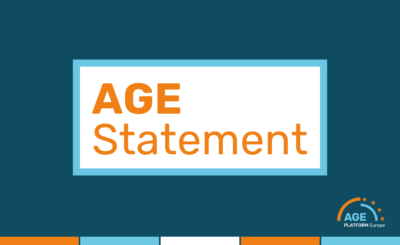
Discrimination, exclusion, loneliness, digital divide, elder abuse or neglect… the pandemic has shed light on issues which were already at stake for older people before the spread of the virus. This has been confirmed by the findings of our second AGE Barometer assessing the situation of older people across 9 EU countries.
The recent months have shown how digitalisation can act as an additional barrier to social inclusion; how a lack of investment in long-term care undermines its quality and universal access; and how lockdown and physical distancing measures can ultimately lead to neglect and elder abuse. The 2020 edition of our AGE Barometer contains key information helping to better understand how COVID-19 has worsened the dire situations many older people already experienced before the pandemic. It is based on information from AGE member organisations and available EU data.
It covers nine countries, namely Belgium (Flanders), Cyprus, Czechia, France, Germany, Greece, Portugal, Spain and Slovenia. It is dedicated to: anti-discrimination, social inclusion, health and prevention, disability and autonomy, long-term care and, elder abuse.
How are inclusion, health, autonomy and dignity challenged in old age?
Reports from participating countries clearly show that internet access and the use of social media, the financial situation, the geographical area, the presence of friends and relatives determine social inclusion in older age. It is also greatly influenced by the overall narrative which tends to overlook older people and their contribution to society. A narrative that has been reinforced by the overall stigmatizing communication around the pandemic.
The geographical location and financial resources are also barriers to access proper health care and long-term care. Health inequalities in older age are important and often very much dependent on the socioeconomic status. Rehabilitation and health prevention are not enough promoted. Informal care is mostly voluntary and needs more support, in particular considering the increased demand for domestic care.
As for elder abuse, although it has gained visibility during COVID, the issue remains widely underestimated, and too often older people do not dare to report due to their situation of dependency and a lack of support. Accessibility to victim support networks for older victims is largely determined by the person’s own condition.
As our Barometer also reports, older people facing multiple discrimination experience accumulated effects of stigmas and discrimination. This undermines even more their inclusion, autonomy and access to health and care. Our special focus helps to better understand the specific situation of older Roma and older LGBTI people.
Impact of the COVID-19 outbreak
The preparation of this 2020 edition which started in Autumn 2019 has been perceptibly impacted by the COVID-19 outbreak. The pandemic was clearly reflected in the input shared by participating AGE members. This Barometer can therefore be read together with the other two major documents published by AGE in relation to the pandemic and in which AGE members have been actively involved:
- Report on “COVID-19 and the human rights of older persons” (18 May 2020) which is based on input and testimonies shared by AGE members.
- Working document on “Recovery from the COVID-19 crisis: do not repeat the errors of the 2008 Great Depression” (2 June 2020) which addressed to the European Union the recommendations on the socio-economic measures to be deployed in the aftermath of the pandemic’s outbreak.
Our recommendations in this key political momentum
The Barometer also comes into a key political momentum following the EU Council conclusions dedicated to the rights of older persons in the era of digitalisation adopted in October 2020, the forthcoming Green Paper on Ageing and Action Plan on the European Pillar of Social Rights. Based on a cross-cutting analysis of the Barometer, we have drawn several recommendations, notably to continue influencing these processes:
- Fill the missing data gap:
- Improve disaggregated data collection on ageing issues by institutions of reference at EU level.
- Ensure proper participation of older persons to improve the quality of the collected data.
- Close the digital divide:
- Invest into digital skills and life-long learning for all.
- Maintain quality alternative solutions to digitalised services.
- Ensure a proper implementation of EU legislation strengthening accessibility.
- Make health and long-term care systems truly resilient:
- Invest in health promotion, disease prevention and quality long-term care.
- Use the Action Plan on the European Pillar of Social Rights as a lever to put forward an EU legislative initiative in the field of care.
- Reinforce synergies across governance levels, from the global to the local level, to strive alignment of political initiatives and implementation measures for a true universal health coverage, leaving no one behind.
The AGE Barometer complements our recent contribution to the implementation of the European Pillar of Social Rights and its 20 “principles” (rights). Our submission reflects the perspectives of older people and how the Pillar should contribute to addressing existing challenges. It focuses on the rights to long-term care and to old-age income.
Useful links:






